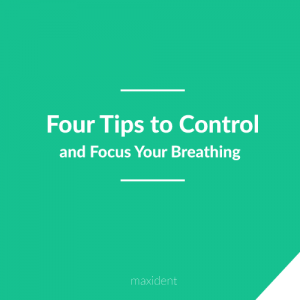
How important is breathing to managing your stress? It is significantly important. Your breathing actually contributes to stress if you fail to control it. The typical stress response is shallow, upper chest breathing, which many of us have become accustomed to without even realizing it. When we become anxious, our breathing changes and rather than using our diaphragms, we use our shoulders and our chests. We can even go so far as to develop shallow over-breathing or hyperventilation. This only makes our feelings of anxiety and our physical symptoms worse and the less oxygen to our brains, the worse our brains function.
How do we fix this way of breathing? We learn to control it, and by controlling it, we reap the benefits such as—reduced anxiety, decreased blood pressure and heart rate, increased immune system functioning, and increased physical energy. This also promotes the kind of calm we look for in our everyday lives no matter how busy we get. The following are four tips to establish breath control and focus.
1. Practice Abdominal Breathing
Shallow chest breathing is a bad habit we have all gotten into without realizing. Instead of breathing down into our diaphragms, we have developed upper chest breathing—short shallow breaths that contribute to stress. It is important to change our shallow chest breathing to deep abdominal breathing. This means inhaling air in through the nose fully to fill the lungs and allow the belly to rise, encouraging more oxygen to reach the brain.
Find a quiet and relaxing environment to spend 10-20 minutes practicing abdominal breathing. Sit in a comfortable position and place one hand on your chest and one hand on your abdomen. While breathing, notice the movement of your abdomen. Feel as the tension slips away and leaves you in an enjoyable sensation of physical relaxation.
2. Take Six Seconds Out
A breathing technique that only takes six seconds out of your day is perfect for everyone—busy or crazy. Established by Dr. Charles Stroebel, this exercise can be done anywhere at any time.
First, note what is making you stressed then get to work on relaxing:
- Smile to release endorphins
- Say something positive and encouraging to yourself
- Take an easy and deep breath
- Visualize air moving through holes in the soles of your feet and filling your abdomen
- Exhale and relax your jaw and shoulders
- Visualize warmth moving through your body.
3. Sing Your Heart Out
Singing goes hand-in-hand with breathing, and may be one of the best and most entertaining ways to help control it. The short and shallow breathing most people adapt throughout the work day will not suffice for a singer. Producing the right sound at the right pitch and volume requires breath control. So, in order to sing like a professional, the breathing has to change significantly. If you aren’t a singer and don’t like singing, then just take this as a breathing exercise without sound. (But come on! We all know you sing alone in the shower). However, even if you don’t sing, breathing like a singer is a great stress-reliever because you are breathing more deeply and more fully.
Start by putting one hand on your back, the other on your stomach with both at waist-level, and inhale to fill your lower lungs with air. In doing so, you will feel your stomach push your hand out. Exhale slow letting your abdomen push your hand out. Don’t force it. Do this ten times.
Now, if you’re ready, inhale to fill your lungs all the way to the lower abdomen, and instead of exhaling slowly, pick a note you’re comfortable with at a pitch that won’t cause strain, and hold through the exhale. Repeat, but each time, change the note.
4. Establish Mindfulness
According to Webster’s Dictionary, mindfulness is the practice of maintaining a nonjudgmental state of heightened or complete awareness of one’s thoughts, emotions, or experiences on a moment-to-moment basis.
Before work:
Becoming aware of your body and your breathing will help you to take control of your day, so take some time to focus on your breathing; it is always a good idea to wake up slow, stretch your limbs, and relax your muscles while breathing slow and deep, filling your lungs to their capacity before letting the air out. This will help relax and prepare you for the day ahead.
At Work:
There is no such thing as multi-tasking only managing your priorities, and this can be achieved effectively by finishing one task before getting started on another one. By doing this, you will not be dividing your focus and you will be putting your all into each and every task you do. It is also important to love what you do. It doesn’t necessarily mean you have to love everything about the job, but focus on the parts of the job you like rather than on the ones you don’t and you will find you enjoy it a lot more. Gazing out the window or talking to one of your colleagues can also help you stay mindful.
After Work:
Of course, when the job is done and it’s the end of the day, it’s important to leave work behind so that you can focus on what or who awaits you at home.
Breathing is imperative to our way of life and learning to control it by taking a short exercise break, singing, or even just staying aware will reduce stress, decrease anxiety, and give you the calm you need to manage stress and hold power over your day.
Suggested Page:






